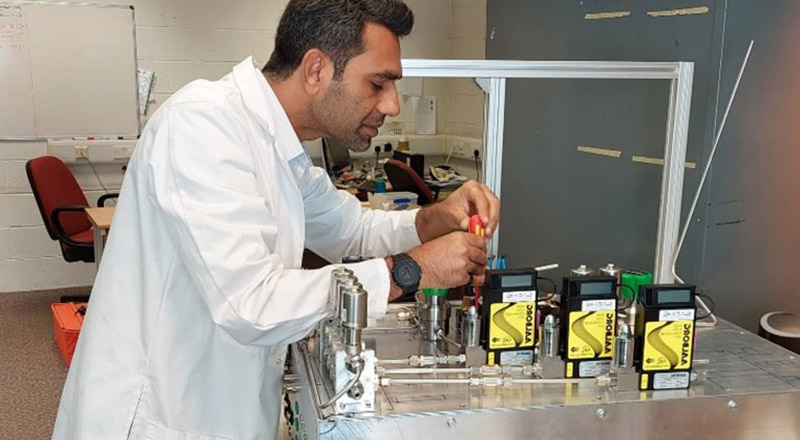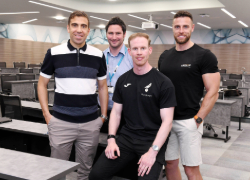Project ‘Joseph’ to deliver ground-breaking hydrogen purification technology
A new project developed by Teesside University alongside a leading industry partner is set to make a major impact in the implementation of hydrogen as a net-zero fuel.

Scientists at the university are working with leading hydrogen consultancy EnAcumen to develop a first-of-its-kind hydrogen purification process.
The project is developing a unique technology which aims to overcome the difficulties in extracting hydrogen from ammonia.
Ammonia, a compound of nitrogen and hydrogen, has long been acknowledged as integral to the successful implementation of hydrogen as a commonly used fuel.
Its zero-carbon and high hydrogen content is recognised as an effective hydrogen carrier; enabling hydrogen to be safely and efficiently stored and transported to the point of use.
The well-established facilities for ammonia production and infrastructures worldwide for storage and transmission provide ammonia with indispensable advantages, underpinning its role in enabling a clean energy future.
At the intended ‘point of use’, ammonia can be decomposed into hydrogen and nitrogen with minimal energy and free of carbon emissions.
However, the current decomposition technology leaves residual ammonia and nitrogen by-products which are considered as impurities and can poison the intricate components of hydrogen fuel cells, debilitating their performance and rendering them ineffective at converting the chemical energy of hydrogen to electricity.
As a result, scientists around the world are striving to develop a conjoint ammonia and nitrogen removal process that provides clean and pure hydrogen for any fuel cell. The stringent process requirements are nearly impossible to achieve via standalone cleaning methods.
The Teesside University and EnAcumen team have embarked on a difficult pathway to develop and test a novel tandem separation process for ammonia and nitrogen.
The project, named ‘Joseph’ after the renowned 18th century British chemists Joseph Black and Joseph Priestley who worked to sperate ammonia gas, combines membrane and sorption mechanisms for effectively separating ammonia and nitrogen, resulting in pure hydrogen for the use in fuel cells.
We are excited to be a part of this important collaboration with TVHIP, as we work together to explore and evaluate diverse processing technologies for hydrogen production and purification.
The Teesside University technical team working on ‘Joseph’ consists of leading chemical engineering experts in gas separations and process safety, Dr Faizan Ahmad, Dr Humbul Suleman, Dr Paul Russell and Dr Danial Qadir.
The project forms part of the Tees Valley Hydrogen Innovation Project (TVHIP), a Teesside University-led initiative which is supporting the growth of the region’s hydrogen economy.
Joseph’s technical lead Dr Faizan Ahmad said: “This is an exciting time for the hydrogen economy.
“Effectively removing ammonia and nitrogen after its decomposition has remained the biggest bottleneck.
“We are positive that have such a growing choice of potential separation technologies like Joseph will inspire further development in hydrogen fuelled energy generation and transport options."
Dr Humbul Suleman, who is investigating different sorption options for the technology, added: “This research under the TVHIP will provide sister solutions in the field of carbon capture, pollution abatement, and greenhouse gas removal.”
EnAcumen has entered a strategic partnership with TVHIP to collaborate on research, co-innovation, talent development and to encourage the exchange of ideas for developing off-the-shelf solutions for hydrogen purification.
CEO Kevin Fothergill said: “At EnAcumen, our mission is to help our customers solve the most demanding technical and scientific problems of the future, and we are constantly evaluating new technologies that can help achieve that.
“We are excited to be a part of this important collaboration with TVHIP, as we work together to explore and evaluate diverse processing technologies for hydrogen production and purification."
In the News
£11 million project to support hydrogen innovation in the Tees Valley
Pollution Solutions, Web, 02/11/2022
Teesside University and Durham University are collaborating on a ground-breaking project to accelerate decarbonisation in the Tees Valley.
£11 million project to support hydrogen innovation in the Tees Valley
Pollution Solutions, Web, 02/11/2022
Teesside University and Durham University are collaborating on a ground-breaking project to accelerate decarbonisation in the Tees Valley.
Project to deliver ground-breaking hydrogen purification technology
Tees Business, Web, 27/10/2022
Scientists at the university are working with leading hydrogen consultancy EnAcumen to develop a first-of-its-kind hydrogen purification process.
Project Joseph to deliver ground-breaking hydrogen purification technology
Renewable Energy Magazine, Web, 24/10/2022
A new project developed by Teesside University alongside a leading industry partner is set to make a major impact in the implementation of hydrogen as a net-zero fuel.
Teesside project to deliver hydrogen purification technology
Northern Echo, Web, 21/10/2022
A new project developed by Teesside University alongside a leading industry partner is set to make a major impact in the implementation of hydrogen as a net-zero fuel.
Project Joseph to deliver new hydrogen technology solutions
Northern Echo, p.35, Print and Web, 20/10/2022
Scientists at Teesside University are working with leading hydrogen consultancy EnAcumen to develop a first-of-its-kind hydrogen purification process.
Purification technology will overcome challenges of extracting hydrogen from ammonia, says group
Envirotec Magazine, Web, 20/10/2022
The Teesside University and EnAcumen team have embarked on a difficult pathway to develop and test a novel tandem separation process for ammonia and nitrogen.
 Alumni support elite football event
Alumni support elite football event Girls explore digital careers at state-of-the-art new
...
Girls explore digital careers at state-of-the-art new
... Teesside University start-ups Selected for prestigious
...
Teesside University start-ups Selected for prestigious
...